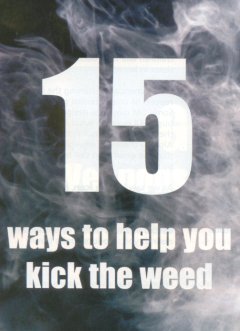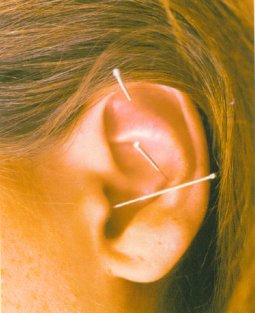Originally published in August 2003 icon

This is not about WHY; you know that smoking is life-threatening, expensive, anti-social and makes your breath smell. This is about HOW because chances are you’ve already tried to stop and crept guiltily back into the fold. It won’t be easy this time either...but according to a new Cancer Research UK study, people who give up for a year have a better than even chance of quitting long-term. And, remember, people who manage to give up smoking are WINNERS.
Please be clear smoking is not just linked to lung cancers, but many cancers and diseases. Giving up smoking is an important step in lung cancer prevention.
Because smoking is both a physiological and psychological addiction, you need a two-pronged attack:
1:
Breaking habits is top priority, so if you always smoke when picking up the telephone, drinking coffee, logging on, change your routine. Keep busy, do something with your hands, go somewhere interesting where smoking isn’t allowed. Or give up on holiday, away from the normal triggers.
2:
Simultaneously cut down the drug. Cold turkey or softly, softly... it’s whatever turns you off. Cutting down gradually is less painful but many people can’t do it - one puff and they’re on 20 a day. Try smoking one less every day, or starting to smoke an hour later. Whatever you decide, fix a date by which you’ll be a nonsmoker and tell everyone.
3:
By willpower alone? Great if you can but nicotine is highly addictive (even more than cocaine). Nicotine Replacement Therapy (NRT) in its many guises (gum, capsules, patches inhalants) reduces the cravings and according to a new survey, increases your chances of quitting for a year by 45%. You should be able to reduce the dose after three months and abandon it after six, although we know two people still chewing after five years! Side effects are minimal - dry mouth, hiccoughs, occasionally palpitations, but no long term effects have been reported. When it doesn’t work it’s usually because people aren’t taking enough or for long enough. Most forms of NRT can be prescribed on the NHS.

4:
There’s no clear evidence about acupuncture but acupuncturists claim that it stimulates the body’s healing response and if it works for you, it works. Ditto hypnotherapy which creates a state of deep mental relaxation when you may be open to suggestions about changing your lifestyle. Some people find Chinese herb therapy useful and even herbal cigarettes can help by keeping your hands occupied.
5:
Zyban (bupropion hydrochloride), by GlaxoSmithKline, a prescription drug that does not contain nicotine, is thought to double people’s chances of stopping. Can be used alongside NRT and works by counteracting the effect of chemicals in the brain responsible for withdrawal symptoms. There have been questions about its safety; side effects can include nausea, dizziness, influenza type symptoms and palpitations. Not recommended for anyone with epilepsy, or a history of seizures or eating disorders. There have been rare cases of deaths associated with Zyban though it’s still much less risky than smoking. Try another method first.
6:
Persuade a friend or family member to give up with you. Help each other when you’re dying for a fag (though no one ever died of nicotine withdrawal). As with all addictions do it one day at a time. Pick up the phone when you’re desperate to pick up a fag - Try: NHS Smoking helpline 0800 169 0169 Quitline 0800 00 22 00 or the Roy Castle Lung Cancer Foundation website (http://www.roycastle.org).
7:
Pamper yourself. A 20 a day smoker spends around 1600 a year. Splash some of the cash you save- a weekend in the South of France, new sound equipment, quality wine.
You’re worth it!
8:
Worried about gaining weight? The average gain is 6 lbs, a small price to pay and you can lose it when your metabolism settles down. Fill up with fruit and vegetable, not sweets and chocolate. Don’t ruin your teeth with manic peppermint chomping. Stock your fridge with low calorie treats. Chew pumpkin, sesame and sunflower seeds or nibble dried apricots, raw carrots, radishes or tiny plum tomatoes.

9:
Exercise will keep your spirits up, work off the frustrations of not lighting up and help keep your weight stable. Swimming, tennis, running, whatever - build a regular routine - it’ll generate happy hormones to replace the high you’re missing from the nicotine. And now, you can afford to join the health club.
10:
Withdrawal symptoms... you’ll certainly get them if you were a serious smoker. NRT can help and most will pass within a few days or weeks. Most common are acid indigestion and heartburn, diarrhoea or constipation, insomnia and respiratory symptoms. Occasional problems include bleeding gums, headaches and muscular pains. All are normal and will pass but seek help if they persist.
11:
The good news is your sense of smell will improve, your taste buds will perk up and your body will begin to repair itself immediately. Blood pressure and pulse rate return to normal only 20 minutes after stopping, carbon monoxide is eliminated 24 hours later and your body is free of nicotine after 48 hours. In three to nine months lung function has increased by up to 10% and 10 years after stopping your risk of lung cancer has fallen to half that of a smoker.

12:
Don’t overdo the alcohol. A few beers or a bottle of wine down the line and your resolve will weaken. Just the one... but it won’t be just the one.
13:
If you do weaken, make a new resolve and start again. Most people try quitting three or four times before succeeding. You probably didn’t even enjoy that rogue cigarette anyway - after a week or so they don’t taste so good - it’s mostly the idea that’s seductive.
14:
Any friend who tries to tempt you is no friend; strike them off the list. If you’re offered a cigarette, simply say you don’t smoke. Say it enough times and you’ll believe it. Remember the first couple of weeks are the worst but there will be danger points for months. You can rise above them.
15:
Congratulations... you’re a non smoker. You’re no longer a public menace (passive smoking hospitalises 17,000 under-fives annually), your hair, teeth, skin, nails, will lose that attractive yellow tinge, you’ll wake without a sore throat, you can be pregnant without worrying about nicotine damage and you’ve proved you can conquer a deadly addiction.
Now show a little compassion for people who are still under the weed - help them to help themselves. And, if you have a tip to pass on, write to Icon and we’ll print your letter.
For more help, try the information on the following sites:
www.ash.org.uk
www.nosmokingday.org.uk
www.guit.org.uk
www.givingupsmoking.uk